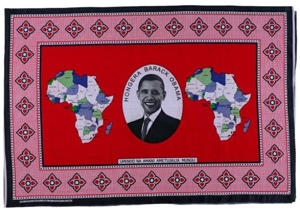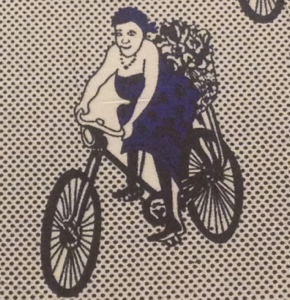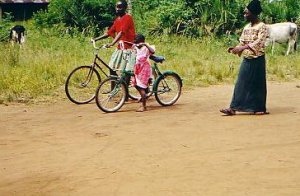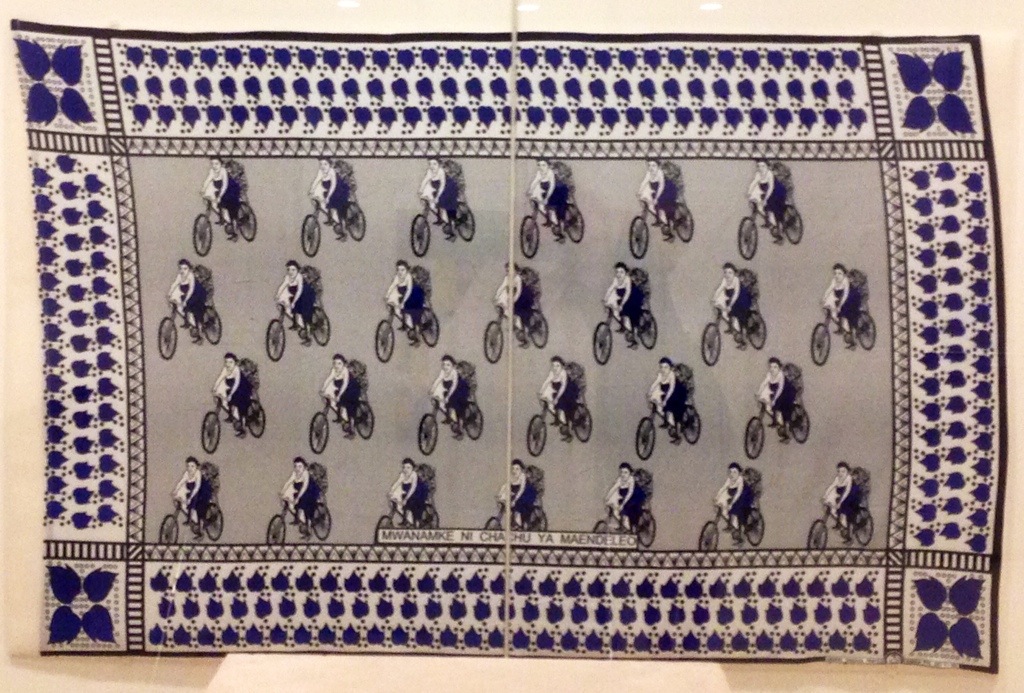Powerful women on bicycles are everywhere these days–even in the stairwells of The British Museum!
The “Woman power” bicycle kanga shown above hangs in The British Museum’s North Stairs near the Africa galleries. It was printed for the Kali Mata Ki Jai (KMKJ) women’s centre in Gezaulole, Tanzania in 2005. The “woman power” kanga shows a woman on her bicycle with a cargo basket full to the brim. She smiles as she pumps the peddles, riding towards her destination with confidence and determination. Text along the lower side of the print reads “Mwanamke ni Chachu ya Maendeleo,” which translates to “woman is the yeast for development.”
The Kali Mata Ki Jai women’s centre of Gezaulole was established in 1990 by three local women who’s objective was to contribute to development and improve conditions for women in their community, a village of about 5000 people located 10 mile south of Dar es Salaam on the east coast of Tanzania. The centre’s name translates to “long live the black mother.” Before long, a group of ten women were working on projects through the collective. Kali Mata Ki Jai supports women through micro credit training, marketable crafts such as printed cotton and basketry, henna production, small scale farming of crops such as mushrooms, and cycling lessons for girls and women. A charitable foundation based in the Netherlands, KMKJ-ND, which sees cooperation among women in rural communities as a starting point for development, has worked with the centre since 2000.

The “Woman power” kanga was produced as part of an initiative aimed at promoting cycling for girls
and women, as well as acting as a business model for micro-finance projects. A kanga is a rectangular panel of printed cloth including a written statement and worn as a garment most commonly in pairs by women or occasionally singly by men. The Kiswahili word ‘kanga’ means guinea fowl, which reflects the fabric’s ornate, colourful and often spotted patterns. The fabric provides a medium for women to communicate or speak out, and political messages are often printed on kangas, such as the example shown right of an Obama kanga also from The British Museum collection.

Women at the Kali Mata Ki Jai centre designed the bicycle fabric in 2004, which was then printed at Urafiki, one of the oldest textile factories in Dar es Salaam. The project was financially backed by KMKJ-ND and the NCDO Front Office as part of the Micro Credit Fund for Rural Women in Tanzania. 4500 kangas were produced for sale in Tanzania and the Netherlands, and by 2005 they had all been sold. Two were purchased by The British Museum, one in the blue tones shown above and another in russet colours. The “Woman power” bicyle kanga went on display at The British Museum in 2013 as part of the Social Fabrics Exhibit.
 Profits from the “Woman power” kanga bolstered the financial independence of the women involved in its production and their earnings represented an important contribution to their family units, thereby giving them more power and respect at home. The image of the woman cycling that decorates the kanga speaks about another type of independence and power–a powerful, independent woman cycling with determination, such as the Kali Mata Ki Jai mother cycling with her daughter shown left, as she navigates towards a better future with each turn of the wheel.
Profits from the “Woman power” kanga bolstered the financial independence of the women involved in its production and their earnings represented an important contribution to their family units, thereby giving them more power and respect at home. The image of the woman cycling that decorates the kanga speaks about another type of independence and power–a powerful, independent woman cycling with determination, such as the Kali Mata Ki Jai mother cycling with her daughter shown left, as she navigates towards a better future with each turn of the wheel.
You can read more about the “Woman power” bicycle kanga on The British Museum Online Collection or the Kali Mata Ki Jai websites.
Sources
Main Image: Photographed by Sheila Hanlon at The British Museum, July 2014
“Woman power bicycle kanga,” British Museum Collection Online www.britishmuseum.org/research/collection_online/collection_object_details/collection_image_gallery.aspx?partid=1&assetid=742463&objectid=1601570
Christopher Spring, “The World in Twenty Objects: Barack Obama’s Kenyan Victory Kanga,” The British Museum Blog, http://blog.britishmuseum.org/tag/kanga
Kali Mata Ki Jai website, www.vrouwen.net/kalimata/







